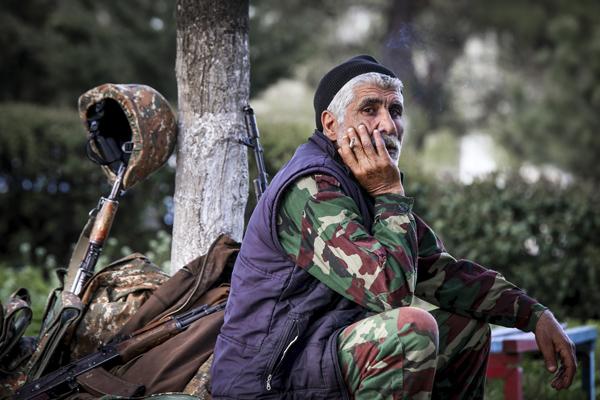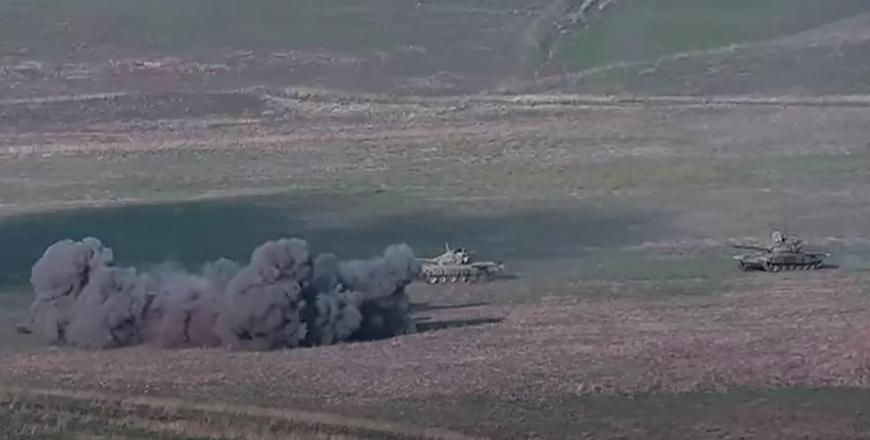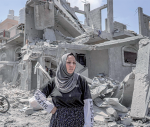You are here
Azerbaijan, Armenia locked in deadly clashes over Karabakh
By AFP - Apr 04,2016 - Last updated at Apr 04,2016

BAKU — Clashes between Azerbaijani and Armenian forces over the Nagorny Karabakh region left at least six people dead on Monday as the worst violence in decades over the disputed territory continued for a third day.
A spokesman for the Armenia-backed separatist authorities in Karabakh told AFP that three civilians, including a 92-year-old woman, were "brutally killed" by Azeri troops" in the village of Talysh in the breakaway region.
Azerbaijan said three of its troops were killed overnight when Armenian forces shelled its positions using mortars and grenade launchers.
Russia, West urge ceasefire
The latest casualties take the death toll to 39 after clashes over the region — seized by Armenian rebels from Azerbaijan in a war that ended with an inconclusive truce in 1994 — erupted on Friday night, prompting Russia and the West to call for an immediate ceasefire.
Azerbaijan has claimed to have captured several strategic positions inside the Armenian-controlled territory — internationally recognised as part of Azerbaijan — in what would be the first change in the front line since the ceasefire 22 years ago.
Armenian President Serzh Sarkisian said Monday that a "ceasefire would only be possible if the militaries of both sides return to the positions" they held prior to the outbreak of hostilities.
His comment came a day after Azerbaijan announced a unilateral truce that failed to stop the fighting.
The energy-rich state, whose military spending exceeds Armenia's entire state budget, has repeatedly threatened to take back the breakaway region by force if negotiations fail to yield results.
In the Armenian capital Yerevan, defence ministry spokesman Artsrun Hovhannisyan said that Karabakh forces had "seriously advanced at certain sectors of the front line and took up new positions".
The report was quickly dismissed as "untrue" by Azerbaijan.
Russia and the West have called for a ceasefire, with President Vladimir Putin, a key power broker, pushing for an immediate end to the fighting, and Moscow's diplomats and military pressuring both sides.
"We are continuing contacts with Baku and Yerevan so that they hear the signals from Moscow, Washington and Paris," Foreign Minister Sergei Lavrov said Monday.
Mediators from Russia, the United States and France — which have long spearheaded attempts to find a solution to the "frozen" conflict — are set to meet in Vienna on Tuesday.
At least 18 Armenian and 15 Azeri troops have been reported killed in the latest bloodshed, and one of Azerbaijan's attack helicopters shot down.
Both sides claimed to have inflicted heavy losses in manpower and military hardware on each other.
'Geopolitical implications'
Ethnic Armenian separatists backed by Yerevan seized control of the mountainous Nagorny Karabakh region in an early 1990s war that claimed some 30,000 lives. The foes have never signed a peace deal despite the 1994 ceasefire.
Sporadic clashes happen regularly along the front but the latest outbreak represents a serious escalation and analysts warned it risked spiralling quickly.
"The Karabakh conflict has serious geopolitical implications," Sergi Kapanadze, a professor of international relations at the Tbilisi State University, told AFP.
The flare-up "threatens the stability of the strategic Caucasus region which is a transit route of Caspian oil and gas to European markets that bypasses Russia, reducing Europe's dependence on Russian energy supplies", he said.
Russia and Turkey — the major regional powers which are at loggerheads following Ankara's downing of a Russian war plane over the Syrian border in November — have found themselves on opposing sides of the conflict.
While ex-Soviet master Moscow has sold weaponry to both sides and treads a cautious line between the two, it has far closer economic and military ties to Christian Armenia, and maintains a base in the country.
Turkish President Recep Tayyip Erdogan has vowed to back traditional ally Azerbaijan — a secular Muslim Turkic nation — "to the end" in the conflict.
Speaking on Monday, Erdogan vowed that Azerbaijan would "one day" regain control of Nagorny Karabakh.
"We are today standing side-by-side with our brothers in Azerbaijan. But this persecution will not continue forever. Karabakh will one day return to its original owner. It will be Azerbaijan's," Erdogan told a conference in Ankara broadcast live on television.
Related Articles
TERTER, Azerbaijan — Clashes between Azerbaijani and Armenian forces rumbled on Sunday, despite Baku announcing a ceasefire after the worst
YEREVAN — Baku and Yerevan put themselves on a war footing after heavy fighting erupted on Sunday between Azerbaijan and Armenian sepa
YEREVAN/BAKU — Fierce clashes left at least 30 Azerbaijani and Armenian soldiers dead Saturday as Russia and the West urged an immediate cea


















